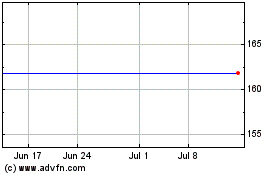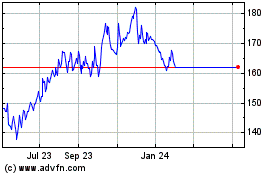Cheneire Circles China After Trade Deal Portends Gas Export Boost
May 12 2017 - 4:41PM
Dow Jones News
By Christopher M. Matthews
A new U.S.-China trade plan could be a boon for companies
looking to export U.S. natural gas, and is already lifting Cheniere
Energy Inc., the early mover in the nascent industry.
Shares of the Texas-based company, the only one to date to
export liquefied natural gas from the lower 48 states, were up 3.2%
in late trading Friday following overnight news of the trade plan.
Cheniere's shares are up more than 40% over the past year.
Cheniere and others planning to export the natural gas that has
become abundant in the U.S. because of shale drilling are hoping
the trade plan represents a blessing from the Chinese government to
open one of the world's fastest-growing import markets. China has
thus far eschewed long-term supply deals with the U.S.
"The Chinese have had concerns about the U.S. honoring long-term
contracts with a Chinese counterparty, so we're really pleased with
the language that came out," Cheniere Chief Executive Jack Fusco
said in an interview. "My aim is to try to finance our next round
of growth and I would love to do it with a Chinese
counterparty."
Cheniere has a first-mover advantage, owning the only
operational export terminal on the U.S. Gulf Coast, and thus far
has sent nine spot cargoes to China. But more than 30 others,
including Exxon Mobil Co. and Tellurian Inc., are constructing or
await regulatory approval for the billion-dollar export terminal
facilities, which chill gas to a liquid state, making it more
efficient to export.
U.S. exporters face competition from other gas-rich nations
closer to China, and the preliminary 10-point bilateral trade plan,
released by both governments Thursday, provided few concrete
changes to boost gas trade. Still, Cheniere and its competitors
believe a symbolic statement of support from Beijing will carry
weight with the country's state-controlled energy companies, which
handle most of China's gas imports.
Cheniere has had talks with Chinese counterparties as part of
its ongoing efforts to attract new customers in Asia, according to
Cheniere spokesman Eben Burnham-Snyder. Exporters prefer long-term
deals, which are usually guaranteed, take-or-pay contracts for
terms ranging from 10 to 20 years that help finance costly
infrastructure projects.
China's gas imports have soared as the country attempts to wean
itself off coal as part of an aggressive five-year plan to increase
air quality. China imported more than 28 million tons of liquid gas
in 2016, a 33% increase from the previous year, and is now the
world's third-largest importer.
China has so far sourced relatively small amounts of liquid gas
from the U.S., instead relying on countries such as Qatar,
Australia and Malaysia for its supplies. According to a 2015 report
by the U.S. Energy Information Administration, China sourced 34% of
its liquid gas imports from Qatar and 19% from Australia.
State-owned China National Petroleum Corp. also signed a 30-year,
$400 billion contract in 2014 with Russia's Gazprom to build a
pipeline and supply gas from fields in Siberia.
But changing market dynamics could make U.S. gas more
attractive. The Australian government has imposed export
restrictions, effective in July, which would force producers to
boost domestic supply there before exporting, following a sharp
increase in domestic prices. Uncertainty also hangs over the
Siberian pipeline as Russia has been unable to settle on a route,
delaying the project.
Meanwhile, U.S. gas prices are at historic lows. Chinese imports
have averaged around $8.25 per million British thermal unit,
according to Chinese customs data. The explosion of U.S. fracking
activity has driven American gas prices down to around $3 per mmBtu
-- a situation that is widely expected to persist given enormous
reserves. Cheniere has said it can supply liquid gas to Asia from
$7.5 to $8.5 per mmBtu from proposed expansion facilities, after
factoring transportation costs.
The recently expanded Panama Canal has also significantly
shortened the trip from the U.S. Gulf to China. Eight of the nine
cargoes shipped from Cheniere's Sabine Pass Terminal in Louisiana
passed through the Panama Canal, shaving as much as two weeks off
traditional routes around the Horn of Africa or through the Suez
Canal.
Not everyone is convinced Chinese importers will rush to sign up
for long- term contracts with U.S. suppliers following Thursday's
announcement.
"I might even argue that Chinese likely prefer being able to
receive U.S. LNG without having long-term supply commitments as
Chinese importers have multiple supplier countries to choose from,"
said Jane Nakano, a senior fellow at the Center for Strategic &
International Studies.
Mr. Fusco concedes there are competitive challenges,
particularly from China's neighbors who send gas via pipe, but
believes an abundance of U.S. gas and Cheniere's business model
make it competitive. He noted Cheniere allows customers to redirect
unwanted cargoes and facilitates the transfer, unlike other liquid
gas suppliers in Australia and other countries.
"I don't think you can ignore China and we're going to be
extremely competitive there," Mr. Fusco said.
Write to Christopher M. Matthews at
christopher.matthews@wsj.com
(END) Dow Jones Newswires
May 12, 2017 16:26 ET (20:26 GMT)
Copyright (c) 2017 Dow Jones & Company, Inc.
Cheniere Energy (AMEX:LNG)
Historical Stock Chart
From Mar 2024 to Apr 2024

Cheniere Energy (AMEX:LNG)
Historical Stock Chart
From Apr 2023 to Apr 2024
